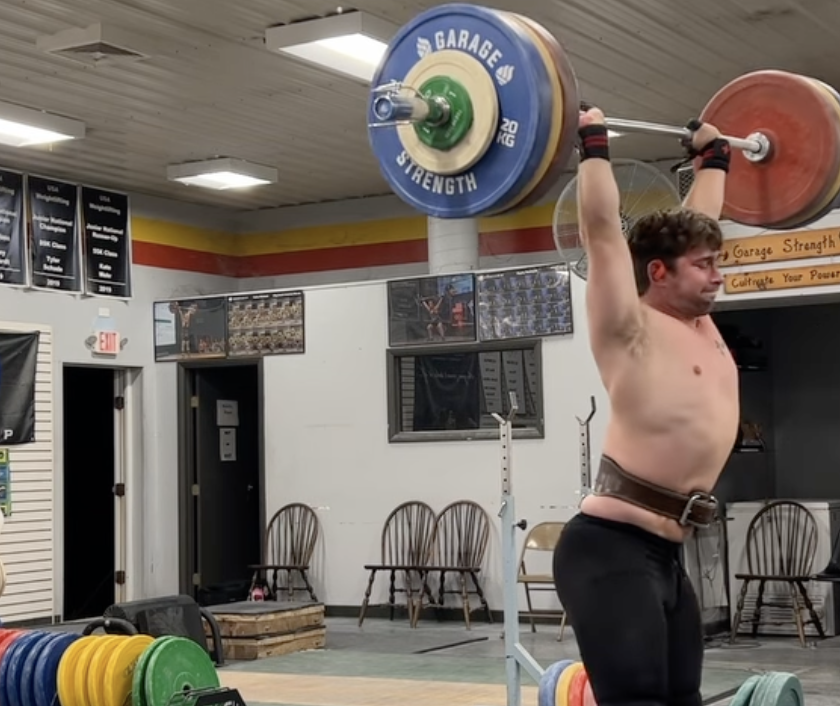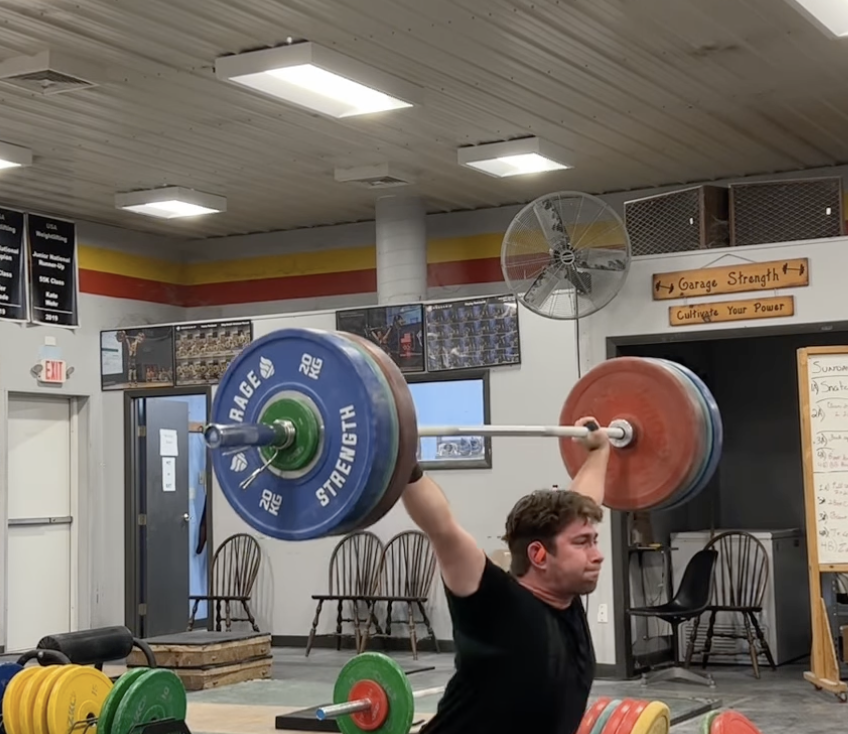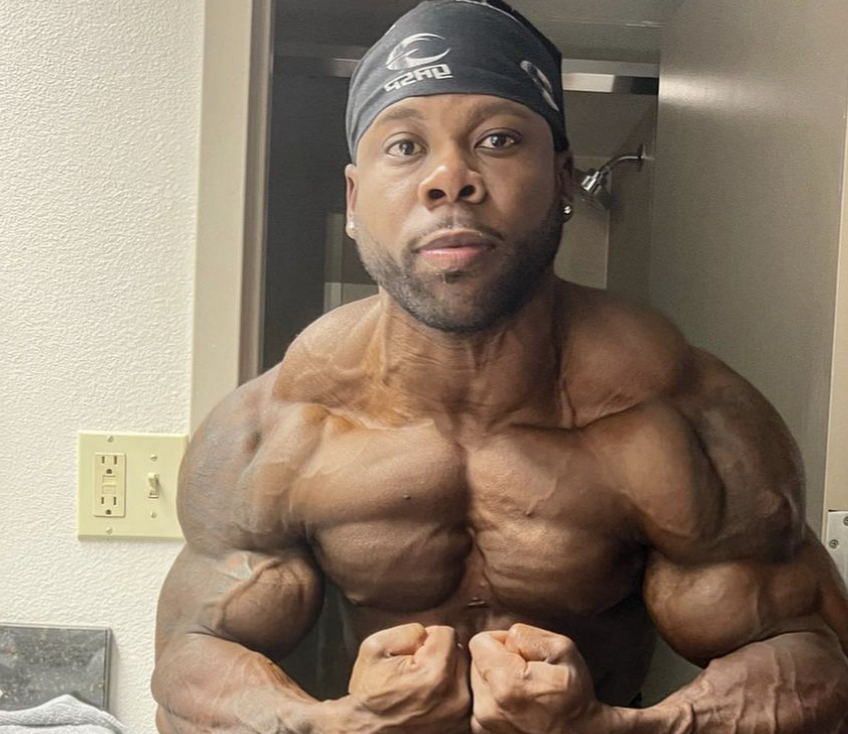Top 5 Shoulder Exercises for Strength and Size
Written by The Boostcamp Editors
Build size and strength in your delts with these five shoulder exercises
Shoulder strength is essential for overall upper body strength and mobility. While they are also aesthetically pleasing, strong shoulders can also help prevent injuries, improve posture, and increase athletic performance. Shoulders are also a very functional muscle, as they play a role in many different daily activities, from carrying in the groceries to picking something up. Our team at Boostcamp is going to look into the anatomy of shoulder muscles and why it's important to work on your shoulder strength. We have also hand-picked our list of the top 5 best shoulder exercises for strength that you can easily incorporate into your workout routine. From a compound exercise such as the overhead press to the dumbbell lateral raise, we'll cover everything you need to know about these exercises including benefits, proper technique, and precautions.
So grab your dumbbells and let's get started on building those strong shoulders!
Understanding the Importance of Shoulder Strength

Your shoulder strength plays a crucial role in improving upper body stability and range of motion. Strong shoulders not only contribute to better posture but also reduce the risk of injury. They are essential for performing everyday activities like lifting, carrying, reaching, and so on. Building shoulder strength not only enhances overall muscle mass and strength in the upper body but also helps you with functional exercises. By incorporating shoulder exercises that target all of the different muscles in the shoulder into your workout routine, you can further strengthen your shoulders and promote their health.
Role of Shoulder Muscles in Overall Body Strength
The shoulder muscles, including the deltoids, trapezius, and rotator cuff, play a vital role in overall body strength. They provide stability and support for the arms, back, and chest muscles, allowing for efficient movement and improved exercise performance. By targeting the shoulders for strength training, you can enhance not only the size and strength of your shoulders but also the strength and power of other muscle groups in the upper body. So, developing strong shoulders is a great way to boost your overall strength and achieve greater muscle mass.
How Shoulder Strength Affects Your Daily Life
Strong and well-developed shoulders have a significant impact on your daily life. They make everyday tasks, like carrying groceries or lifting heavy objects, easier and safer. Improved shoulder strength also contributes to good posture, reducing the risk of back pain and injuries. Additionally, having strong shoulders enhances performance in sports such as swimming, tennis, and weightlifting. It enables greater range of motion, allowing for more freedom of movement in your daily activities. Building shoulder strength can improve overall body strength, making you feel stronger and more capable in your everyday life.
The Anatomy of Shoulder Muscles
Now that we understand the importance of shoulder strength, let's delve into the anatomy of shoulder muscles, as there are more parts to the shoulders than you may think. The shoulder muscles consist of the deltoids, rotator cuff, trapezius, and other supporting muscles. Each muscle group within the shoulders has a specific function and range of motion. By understanding the anatomy of these muscles, we can effectively target them for strength training exercises. The rotator cuff muscles, in particular, provide stability and support for the shoulder joint. Developing strength in all the shoulder muscle groups leads to balanced muscle growth and greater shoulder stability. So, let's explore the anatomy of shoulder muscles and how it can benefit our workouts.
Major Muscles Involved in Shoulder Movement
When it comes to shoulder movement, the major muscle group responsible is the deltoid muscles. These muscles work together for different types of movements. The anterior deltoid is involved in shoulder flexion, the lateral deltoid is responsible for abduction, and the posterior deltoid is responsible for extension. In addition to the deltoids, the trapezius muscles in the upper back also assist in shoulder movement and stability. Strengthening the deltoid muscles not only improves shoulder strength, but also enhances stability and range of motion. By targeting these major shoulder muscles in exercises, you can achieve well-rounded shoulder development.
Complementary Muscles that Support Shoulder Strength
To achieve optimal shoulder strength, it's essential to target not just the shoulder muscles themselves, but also the complementary muscles that provide support and stability. These include the biceps, triceps, pectoral muscles, and upper back muscles such as the rhomboids and latissimus dorsi. Strong biceps and triceps contribute to the stability and strength of the shoulder joint, while developed pectoral muscles enhance overall shoulder strength. Strengthening the upper back muscles provides stability and support for the shoulder blade, improving shoulder strength. By incorporating exercises that target these complementary muscles, you can create a well-rounded upper body strength training routine.
The Best Shoulder Exercises

Now, when it comes to finding the best shoulder exercises, you want to choose some that hit all heads of the shoulder.
Overhead Press
The overhead press is a fantastic exercise to build shoulder strength and increase muscle mass, specifically in the front deltoid. However it also targets the trapezius and rotator cuffs, providing a complete shoulder workout. By performing the overhead press with proper form, you can improve shoulder stability and enhance your range of motion. Gradually adding weight to the exercise challenges your shoulder muscles, leading to growth and strength gains. Incorporating the overhead press into your routine takes your shoulder strength training to the next level. It's a great way to develop the rear delt, while also engaging other key muscles like the middle trapezius and external rotators.
Benefits of Overhead Press
The overhead press is a fantastic exercise that offers numerous benefits for your shoulders and overall upper body strength. This compound movement targets the anterior deltoid, lateral deltoid, and trapezius muscles, strengthening the entire shoulder muscle group. Additionally, it improves shoulder stability, reducing the risk of injuries during other exercises, such as the bench press. This also helps with the exercises in Olympic weightlifting, such as the clean and jerk and the snatch. The overhead press also engages your core muscles, providing an abdominal workout while you strengthen your shoulders. By incorporating progressive overload, you can experience significant muscle growth and strength gains. Regular overhead press training will result in stronger shoulders, improved upper body strength, and the development of eye-catching boulder shoulders.
How to Perform Overhead Press Correctly
Ready to strengthen your shoulders with the overhead press? Start in a standing position, holding a pair of dumbbells at shoulder height with palms facing forward. To maintain stability and good form, keep your back straight, knees slightly bent (but not too much) and engage your abdominal muscles. Now, press the dumbbells overhead, fully extending your arms and bringing the weights together at the top. Lower them back down, maintaining control throughout the movement. Focus on maintaining good form and range of motion as you perform the overhead press for the recommended number of repetitions. Strengthen those shoulder muscles and enjoy improved upper body strength!
Seated Dumbbell Shoulder Press
Adding variety to your shoulder training routine is essential for muscle growth and strength, and one effective exercise to consider is the seated dumbbell shoulder press. By using dumbbells, each shoulder works independently, promoting muscle balance and strength. This exercise provides stability and isolation work for the shoulder muscles, allowing for targeted muscle growth. The seated position also helps maintain good form, reducing the risk of shoulder injuries during the exercise. Incorporating the seated dumbbell shoulder press into your routine is a great way to challenge your shoulder muscles and add variety to your workouts.
Advantages of Seated Dumbbell Shoulder Press
The seated dumbbell shoulder press offers several advantages for strengthening and developing the shoulders. By performing this exercise, you can increase stability in your shoulder muscles, which is crucial for proper form and injury prevention during various activities. It specifically targets the anterior deltoid, a key muscle group in shoulder growth. Additionally, it helps improve upper body strength and muscle mass while enhancing the range of motion in the shoulder joint. Performing isolation exercises like the seated dumbbell shoulder press is a great way to build stronger shoulders. So grab a pair of dumbbells, find a comfortable position on an incline bench, and start reaping the benefits of this exercise!
Proper Technique for Seated Dumbbell Shoulder Press
To perform the Seated Dumbbell Shoulder Press with proper technique, start by sitting upright with a slight bend in your knees. Hold a pair of dumbbells at shoulder height, palms facing forward. Engage your abdominal muscles for stability throughout the exercise. Press the weights overhead, making sure to avoid locking your elbows. Maintain control as you lower the dumbbells back to shoulder level. This exercise targets the deltoid muscles, including the rear delt, lateral raise, and front raise. It's a great way to strengthen your shoulders without risking shoulder pain or injuries. Remember to keep your form and execution proper for maximum benefits.
Push Press
The next exercise on out list of best shoulder exercises is the push press. By incorporating leg drive, you can increase your shoulder strength and power. This exercise also activates your upper back muscles, providing stability for your shoulders. Not only does the push press target your shoulder muscles, but it also helps increase your heart rate, making it a great way to get a cardiovascular workout. With its full range of motion, the push press allows you to fully engage your shoulder muscles for optimal results. Add this exercise to your routine for stronger, more resilient shoulders.
Why Include Push Press in Your Routine?
Including push press in your routine is essential for developing boulder shoulders, enhancing muscle growth and mass with heavy weights, engaging a variety of muscle groups for a complete upper body workout, adding explosive power to your shoulder training, and challenging yourself with new ways of training the shoulders.
Detailed Instructions for Executing Push Press
To perform the push press, start by standing upright and hold a pair of dumbbells at shoulder height. Bend your knees and then explosively press the dumbbells overhead, fully extending your arms to engage your shoulder muscles. Lower the weights back to shoulder level while maintaining good form. It's important to gradually progress from light weights to heavier ones to avoid the risk of injury. The push press is a great way to activate your shoulder muscles and challenge yourself with a new exercise variation for boulder shoulders.
Barbell Front Raise
The barbell front raise targets the front delts of the shoulder muscles, specifically the anterior deltoid. This isolation exercise helps strengthen the upper arm muscles, providing greater stability. By performing Barbell Front Raise with good form, you can improve muscle mass and definition in the shoulder area. It is a great way to complement your shoulder workout routine. Remember to use an appropriate weight and maintain proper technique throughout the entire exercise for the best results.
Reasons to Choose Barbell Front Raise
When it comes to shoulder training, focusing on the lateral delts is essential for overall strength and muscle growth. The barbell front raise allows you to isolate the lateral deltoid, promoting greater muscle development in that area. By using heavy weights during this exercise, you can achieve both strength and mass gains, further enhancing your shoulder muscles. Performing the barbell front raise while standing adds an extra element of shoulder stability, which can help prevent injuries. Remember to start with lighter weights and gradually increase the load to minimize the risk of any shoulder-related issues.
Comprehensive Guide to Performing Barbell Front Raise
To perform the Barbell Front Raise, start by standing upright, gripping the barbell with an overhand grip and arms extended. Raise the barbell in front of your body, leading with your elbows, until it reaches shoulder height. Pause for a moment at the top, then lower the weight back down in a controlled manner to the starting position. Throughout the exercise, keep your shoulders engaged and your core stable. It's important to start with light weights and gradually increase the load to avoid the risk of injury. Incorporating the Barbell Front Raise into your workout routine can effectively target the anterior deltoid and contribute to overall shoulder strength and stability.
Dumbbell Lateral Raise
Dumbbell lateral raises are a key movement for targeting the lateral deltoid muscles, strengthening the upper arms, and enhancing the appearance of the shoulder muscles. By isolating the lateral deltoids, this exercise promotes muscle growth and improves stability in the arms. Performing the dumbbell lateral raise with good form is crucial for optimal results. It's a great way to add variety to your shoulder workouts and can be done using a pair of dumbbells. Remember to maintain proper technique, engage the middle trapezius, and avoid shoulder pain by starting with lighter weights and gradually increasing the load.
The Impact of Dumbbell Lateral Raise on Shoulder Strength
If you're looking to develop stronger lateral deltoid muscles and improve your shoulder strength, incorporating the dumbbell lateral raise into your workout routine is a great way to achieve these goals. By performing this isolation exercise with a pair of dumbbells, you can activate the lateral deltoids for greater muscle growth and definition, resulting in boulder shoulders. It's important to use light weights to ensure good form and minimize the risk of injury. The dumbbell lateral raise is an effective exercise that can help you increase shoulder stability, enhance range of motion, and achieve your desired shoulder strength.
How to Do Dumbbell Lateral Raise Safely and Effectively?
To perform a dumbbell lateral raise safely and effectively, keep a slight bend in your elbows for shoulder stability. Focus on raising the dumbbells to shoulder height, targeting the lateral deltoid muscles. Use lighter weights to isolate the muscles and avoid swinging or using momentum. Stand for better range of motion and shoulder growth.
Where to Find Workout Programs
Now you can certainly throw these exercises in your routine whenever you feel like it, or you could follow a structured workout program that helps to guide you to make great progress. That being said, Boostcamp is the go to place to find a good workout program, as the app holds over 50 free workout programs that are written by some amazing coaches.
If following a pre-written program is not your style, then you can use the Program Creator tool to construct your own program however you want, and track your progress every step of the way.
Conclusion
In conclusion, incorporating shoulder exercises into your fitness routine is essential for overall strength and functionality. The shoulder muscles play a significant role in various daily activities and contribute to your overall body strength. By targeting these muscles through exercises like the overhead press, seated dumbbell shoulder press, push press, barbell front raise, and dumbbell lateral raise, you can improve your shoulder strength and enhance your physical performance.
Remember to perform each exercise with proper form and technique to maximize the benefits and prevent injuries. Start with lighter weights and gradually increase as you build strength. Whether you're an athlete, fitness enthusiast, or someone looking to improve their upper body strength, these exercises will help you achieve your goals.
So, don't neglect your shoulder muscles - give them the attention they deserve and enjoy the benefits of increased strength and functionality in your daily life. Get started with these exercises and take your fitness journey to new heights!
Check out the Boostcamp App for some great programs. Also, be sure to follow Boostcamp on Instagram and subscribe on YouTube!

Header image courtesy of Instagram (keone_prodigy)
Body images courtesy of Instagram (depth.vader)

